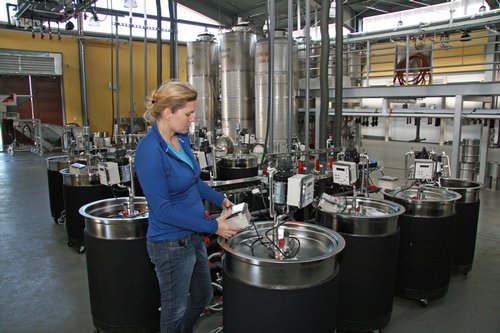Posts Tagged: tomato processing
UC Davis tomatoes provide year-round healthful eating for college students
At the same time, chefs and food buyers at universities, particularly the University of California, are selecting for high-quality fruits and vegetables, produced locally and sustainably. Universities with strong food sustainability programs are rightfully proud of what they're doing to educate students about food production, health, and nutrition. UC Davis Dining Services prioritizes the purchase of locally grown food (ideally within a 50-mile radius of campus). Most University of California campuses have similar programs.
At UC Davis, fresh roma tomatoes are picked each August from the 300-acre Russell Ranch, part of the campus's Agricultural Sustainability Institute, then processed within hours by campus Dining Services to provide year-round tomato sauce for pizza, pasta, and ratatouille. All told, 10,000 pounds of tomatoes are processed during a two-week period in August. About 29 percent of the total food served in the campus's residential dining halls is from local, organic or sustainable sources.
The tomatoes grown at Russell Ranch are part of a long-term academic research project that examines factors such as farming methods, irrigation needs, crop rotations, yield, and nutritional content. At the end of the growing season, some of the many tons of tomatoes are purchased by Dining Services at market value.
Emma Torbert, an academic coordinator at the UC Davis Agricultural Sustainability Institute, noted, “Connecting the food system to the research is really interesting. A lot of times there is confusion about where our food is coming from. The more people are educated, the more educated decisions they can make.”
Many UC Davis faculty and staff are so impressed with the food choices at the dorms that they purchase individual meal tickets and enjoy lunches made with the campus-grown tomatoes, herbs, and other vegetables, all of which are part of the daily food array. Public dinners are also offered periodically at the dorms so that community members can sit amongst students to taste and learn about the sustainability programs in the dorms.
Additional Information:
- Video: Farm to Table, UC Davis Tomatoes; 2010
- Slide show of this year's UC Davis tomato harvesting and processing system; 2014
- Sustainable Foodservice Progress Report 2014, UC Davis Dining Services
- Two videos of UC Davis students who work at the Student Farm to produce food, including one on tomato sauce production
- “Tomatoes: Safe methods to store, preserve, and enjoy.” UC Agriculture and Natural Resources, free publication
A new era begins in food and beverage science
A new winery, brewery and food-processing complex began operations this fall at UC Davis. Part of the Robert Mondavi Institute for Wine and Food Science, the technologically sophisticated facilities will be used to teach students, conduct research, and solve practical problems related to foods, beverages and health.
The south wing of the new complex is home to the August A. Busch III Brewing and Food Science Laboratory, which includes the brewery, general foods-processing plant and milk-processing laboratory. The complex’s north wing houses a new teaching-and-research winery. The complex is adjacent to a 12-acre teaching-and-research vineyard and across a courtyard from the departments of Food Science and Technology, and Viticulture and Enology.
The new $20 million, 34,000-square-foot complex, funded entirely by private donations, will be the first winery, brewery and/or food-processing facility to earn LEED Platinum certification, the highest environmental rating awarded by the U.S. Green Building Council. (LEED stands for Leadership in Energy and Environmental Design.)
Features include onsite solar power generation and a system for capturing rainwater and conserving processing water. Stored rainwater will be used for landscaping and toilets.
The winery (right) will capture carbon dioxide, a natural byproduct of fermentation, thus reducing the building’s energy requirements for air quality and temperature control.
Other features include maximum use of natural light, food-processing equipment that minimizes energy and water requirements, use of recycled glass in flooring, interior paneling recycled from a 1928 wooden aqueduct, and use of sustainably certified lumber.
The new brewery will showcase the latest in brewing technology, as well as a sophisticated laboratory for conducting research and training students. It also provides commercial brewers and suppliers with a small-scale facility to test new recipes or processes.
The general foods- and milk-processing laboratories have been built to meet state and federal food- and dairy-grade standards. Products processed there will be used in sensory and nutritional evaluations.
Research in the food-processing pilot plant will examine alternative food-processing methods and their nutritional effects, nutritional quality and shelf life of fresh-cut fruits and vegetables, nutritional enhancements from food-processing “waste” products, and improved food formulations.
The milk-processing laboratory will support research on separation of milk components into functional ingredients, processing of milk modified by different feed rations, and processing of milk from cows bred for specific characteristics.
Dozens of private donors helped make the complex a reality, including a $5 million contribution from the late winemaker, Robert Mondavi, and a $5 million pledge by the Anheuser-Busch Foundation.
Other major donations were made by Ronald and Diane Miller and by a group of winery partners led by Jess Jackson and Barbara Banke of Kendall-Jackson Wines, and Jerry Lohr of J. Lohr Vineyards & Wines. The Department of Viticulture and Enology’s Board of Visitors and Fellows also made significant contributions.
California tomato processors and growers contributed more than $2.5 million to the food-processing pilot plant. Morning Star Packing Company provided a lead gift of $1 million for the food-processing plant. Hilmar Cheese Company also stepped up with a $250,000 pledge.
In all, more than 150 individuals, alumni, corporations and foundations contributed funds for the new winery, brewery and food-processing complex.
(Thanks to Patricia Bailey, UC Davis News Service, who provided content for this post.)
Learn more at http://greenrmi.ucdavis.edu.




